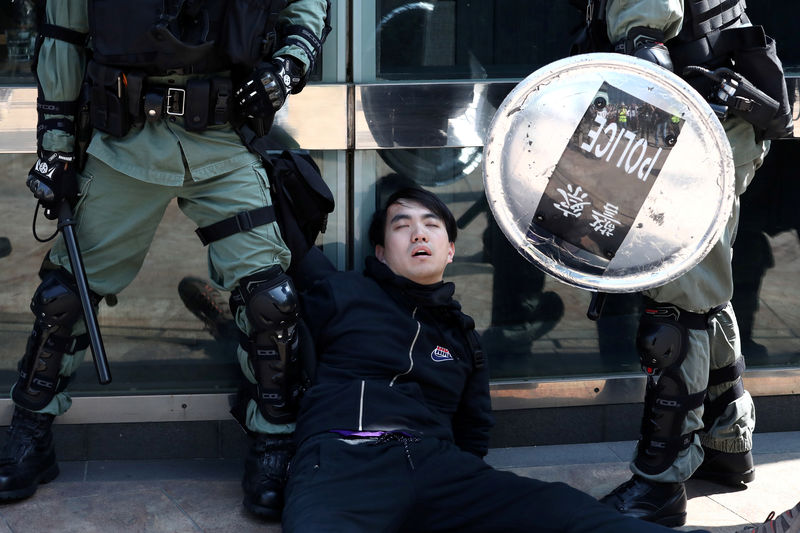HONG KONG (Reuters) - Hong Kong prepared for more clashes on Wednesday as anti-government protesters paralyzed parts of the Asian financial hub for a third day, with some transport links, schools and many businesses closing after an escalation of violence.
Protesters and police battled through the night at university campuses and other locations only hours after a senior police officer said the Chinese-ruled city had been pushed to the "brink of a total breakdown".
Police fired tear gas at protesters overnight in multiple locations as activists blocked roads, torched several vehicles, hurled petrol bombs at a police station and metro train and smashed up part of a shopping mall.
The flare ups come after police on Monday shot an unarmed protester at close range and a man was doused with petrol and set on fire in some of the worst violence since protests began more than five months ago.
Thousands of commuters were queuing at metro stations across the city early on Wednesday after some railway services were suspended and roads closed.
Riot police were deployed at stations, while protesters set up roadblocks and barricades on major thoroughfares.
Protesters are angry about what they see as police brutality and meddling by Beijing in the freedoms guaranteed under the "one country, two systems" formula put in place when the former British colony returned to Chinese rule in 1997.
China denies interfering and has blamed Western countries, including Britain and the United States, for stirring up trouble.
Protesters were planning demonstrations in areas including the Central business district, home to some of the world's most expensive real estate and luxury shops, across the Kowloon peninsula and in the outlying New Territories.
"We just want to affect the Hong Kong economy to let the government know we are serious about our demands," said a 21- year-old student named Lee, who had spent the night making petrol bombs at City University.
"Every day, everywhere, people are getting hurt."
Hundreds of masked protesters, many of them students, hurled rocks and bricks, some launched with catapults, during Tuesday's protests.
There were chaotic scenes through the night at the prestigious Chinese University, with explosions, plumes of smoke, yelling and sustained gunfire during which scores were injured. Hong Kong's Hospital Authority said 81 people had been injured since Monday, with two in serious condition.
The youngest was 10 months old but the cause of the infant's injuries was not known.
Many schools and universities canceled classes on Wednesday after the Education Bureau announced that parents could decide whether to send their children to school and urged them not participate in "unlawful activities".
RETURN TO 'NORMAL'
Dozens of commuters scrambling to get to work tried to stop a rural metro station in the eastern part of the city from shutting after the metro operator, MTR Corp announced it was stopping services there.
Several train lines, stations and bus routes were shut because of damaged facilities, the operator said, adding that its whole train network would shut more than two hours early, by 10 p.m.
"It is very painful to watch my city turn into this. Look at everyone, how angry they are," said Alexandra, a 42-year-old insurance executive who had been trying to get to work.
"We all want to return to normal, but how can the government do that if they don't listen to what Hong Kongers have been asking for."
Outside Baptist University campus, on the Kowloon peninsula, police rammed barricades with buses to clear them. At least two people were arrested before police made a quick retreat.
Hong Kong's stock market dropped 2% to a three-week low in early trade, outpacing falls elsewhere in Asia. The drop came after the city's embattled leader, Carrie Lam, said protesters trying to paralyze the city were being "extremely selfish".
Chinese state media condemned the violence with the China Daily newspaper stating that young protesters were reveling in a "hormone-fueled 'rebellion'".
"It is foolish and naive to believe that Hong Kong would be better off by eliminating all mainland factors. Particularly, since the mainland is the main source of fresh water, electricity and the largest supplier of food to the city."
